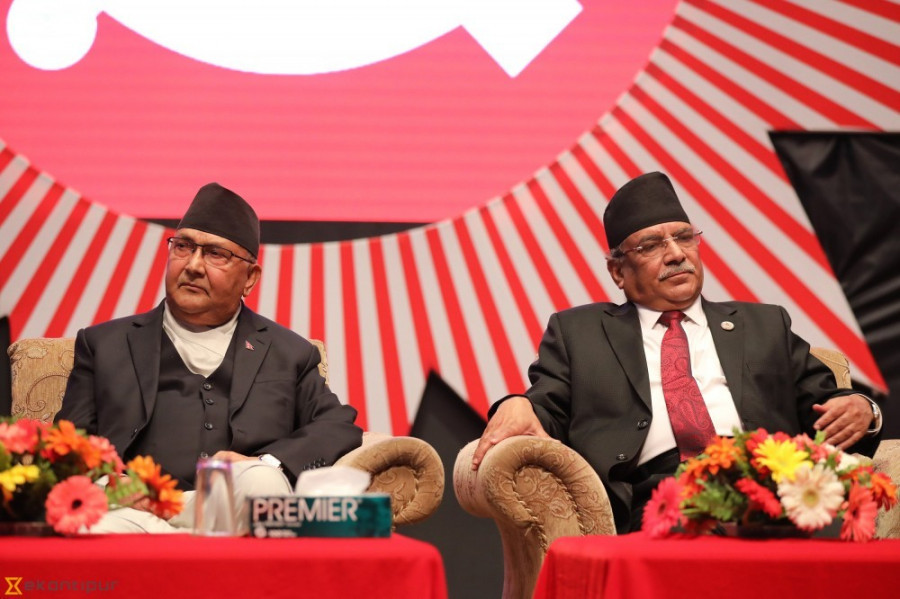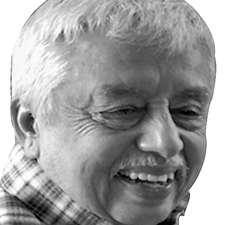Columns
The duel within the Nepal Communist Party
In Nepal's political culture, leaders never retire because politics has paid them well.
Naresh Koirala
The duel between Prime Minister KP Oli and his co-chair in the Nepal Communist Party, Pushpa Kamal Dahal, intensified in November with Dahal accusing Oli of perfidy, insubordination, incompetence, corruption, egotism and hubris. In response, Oli characterised the co-chair as lazy, conniving, corrupt, untrustworthy and devoid of conscience and moral compass. The exchange is beyond the cut and thrust of normal power politics and included accusations of criminal behaviour.
The Nepal Communist Party's rank and file are worried the confrontation may split the party. Should that happen, they would be deprived of the power, prestige and financial gains that the party's control of the government has brought. They are scrambling for a 'unity' formula. But long-term 'unity' in a communist party is hard to come by. It has eluded communists all over the world since the Bolsheviks took power in Russia in 1918. Communist parties are, by nature, prone to ideological conflict, frequent break-ups and mergers. Within the Nepal Communist Party, this propensity for conflict is aggravated by the party's ideological contortions and the competing vested interests of its ageing senior leaders.
The elusive unity
A communist party is like a religious group. It has its scriptures (The Communist Manifesto and related literature), its gods and demi-gods who can never be crossed (Marx, Engels, Lenin, Stalin and some local incarnations, for example, Madan Bhandari); places of worship (party conferences) and preachers (the party operatives). When the community fails to realise the lofty goals set in the scriptures (and this invariably happens) or the leaders do not live by the code of ethics required by the scriptures, priests and pastors (party leaders) are accused of heresy, the reinterpretation of the scriptures begins, and eventually, factions develop much like religious sects as offshoots of mainstream religions.
Hinduism splintered into Shaivism, Vaishnavism and many, many cults. Though the followers of each cult identify themselves as Hindus and swear allegiance to the primary Hindu scriptures like the Vedas and the Gita, records show these splinter groups often clash with each other. Christianity and Islam provide more severe examples of disintegration and murderous infighting.
Communist parties follow a pattern similar to that of religious groups. In the late 1950s, the Chinese and Soviet communists disagreed on the interpretation of their scripture in respect of the strategy to advance the movement, and the world's communist movement split into two major camps. It impacted Nepal's communist movement as well. It broke into pro-Chinese and pro-Soviet factions. And as time went on, they disintegrated into more factions, all calling themselves 'communists'.
Between 1962 and 2013, 50 Nepali communist parties passed through the cycle of breakage and merger. Indian communists are no different. The last time I checked, over 100 communist parties had run through the cycle there. The communist parties in China and the old Soviet Union also have factional fights. However, since more than one communist party cannot exist in these countries, the dissenting voices are crushed before they gather momenta such as the Kronstadt Revolt in 1921 in Russia, and the 'Let a hundred flowers bloom; let a hundred schools of thought contend' episode in China. Both movements resulted in thousands of executions and numerous imprisonments.
Disunity is in a communist party's DNA. It is built into the party's structure and feeds on its ideological contortion when it tries to adapt to a liberal democratic order. Comparatively, the frequency at which political parties of other ideological persuasions break is much less.
Ideological contortion
The ideological contortion within Nepali communists started with the late Madan Bhandari declaring 'People's Multiparty Democracy' as the ideology of the Communist Party of Nepal (Unified Marxist-Leninist), which was Oli's party before the Nepal Communist Party was formed. Bhandari wanted his party to at once embrace the contradictory ideals of democracy and communism. The two are antithetical. There is no place for multiparty liberal democracy in communist evolution. The UML made Bhandari its demi-god, but the hybrid he created made the UML bereft of any ideological underpinning.
The Maoist party led by Dahal also became enmeshed in the same ideological confusion when they accepted multiparty parliamentary democracy as the country's governance model whilst refusing to shake off their communist past. The Nepal Communist Party, formed by the merger of the UML and the Maoists, inherited the same contorted ideology. The lack of ideological clarity is part of the reason for the party's current crisis.
In a communist system, the government takes orders from the party in the exercise of its executive functions. In a parliamentary democracy, the government operates with full independence in exercising its authority. The party's role is to support the government and audit its performance.
One of Dahal’s charges against the prime minister is that Oli does not consult the party when he appoints his Cabinet members and office bearers in senior positions within the bureaucracy. Oli is a 'revisionist', says Dahal, meaning he is reinterpreting The Communist Manifesto in collusion with the bourgeoisie. This would be a serious infraction in a communist set-up but, in a parliamentary democracy, it is a non-issue.
The lack of ideological clarity undercuts the party's sense of purpose, and the unending conflict saps confidence that the party will survive its full tenure in government. This uncertainty creates the environment for political corruption we are witnessing in the Oli government. Everyone seems to be on the take before the government falls. Dahal was right in pointing to unbridled corruption under Oli's watch. But it was like the pot calling the kettle black, as Pushpa Kamal Dahal himself is alleged to be one of the most corrupt politicians in the country.
In Nepal's political culture, leaders never retire because politics has paid them well (they are all very rich), and they have no employable skills for life outside politics. The Nepal Communist Party's 'Senior Leaders' include two ex-prime ministers and one who lost the last election. They have all been given elevated positions in the party. Regardless of their age or success as leaders, they stay active in the party, create factions, and bargain for a share in government or powerful bodies within the party, something that is extensively practised by other political parties.
The charges and counter-charges in Dahal and Oli's recent exchanges have as much to do with their personalities and personal ambitions as with the religion-like structure of the communist movement. The Nepal Communist Party may come up with some band-aid solution to avert its immediate split, but long-term unity in the party is impossible within Nepal's democratic set-up and political culture, particularly when the party is bereft of any coherent ideology. Should the Nepal Communist Party genuinely want unity, they should first free themselves of the ideological bondage of their communist past, and make their party's operation compatible with a multiparty democratic set-up. Then let the oldies go!




 19.12°C Kathmandu
19.12°C Kathmandu















